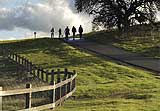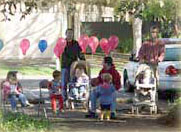
Personal Safety and Protection
Safety Education | Everyday Living | On Foot | Sensing Trouble | Driving
Phone Calls | ATMs | Protecting Children | ID Theft | Computer Scams
Safety & Security Education
 The Stanford Department of Public Safety provides a variety of educational presentations on security awareness and crime prevention programs to all members of the Stanford community as requested. Available presentations include, but are not limited to: crime prevention, property protection, personal safety, identity theft, bicycle safety, seatbelt safety, and child safety. Please call the Department of Public Safety at (650) 723-9633 or e-mail:
crime-prevention@lists.stanford.edu to schedule a presentation or receive written materials.
The Stanford Department of Public Safety provides a variety of educational presentations on security awareness and crime prevention programs to all members of the Stanford community as requested. Available presentations include, but are not limited to: crime prevention, property protection, personal safety, identity theft, bicycle safety, seatbelt safety, and child safety. Please call the Department of Public Safety at (650) 723-9633 or e-mail:
crime-prevention@lists.stanford.edu to schedule a presentation or receive written materials.
For resources on issues of sexual assault and relationship abuse / domestic violence, please visit those respective pages under Crime & Safety Tips.
Everyday Living
- Keep emergency numbers near your phone.
- Lock all doors and windows every time you leave your room, even if it is just to go to the bathroom.
- Keep house and car keys on separate rings.
- Do not lend your keys to service/maintenance people you do not know well.
- Always ask service/maintenance people to identify themselves before allowing them to enter your home or dorm room.
- Get to know your neighbors so you can help each other.
- Do not keep large sums of money, jewelry, or valuable items in plain view in your home or dorm room.
- When out of town, set radios, lights, and televisions on timers.
- If you are living off campus, leave spare keys with trusted neighbors, not under a doormat or in a flower planter.
- Try to avoid entering elevators occupied by strangers. If you are waiting for an elevator with a stranger, stand away from the door to avoid being pushed inside. Get off on the next floor if you feel uneasy. Hit the alarm button if you are accosted on an elevator.
- Please report any broken or malfunctioning locks to the facilities supervisor.
On Foot
- Avoid dark, vacant, or deserted areas. Use well-lit travel routes.
- Avoid walking or jogging alone, especially at night. Ask a friend to jog with you. Call a 5-SURE escort at 725-SURE (7873) to accompany you around campus during evening hours.
- Dress in clothes and shoes that will not hamper movement.
- Be alert and aware of your surroundings at all times. Avoid wearing headsets that impair your ability to detect and respond to potentially dangerous situations.
- Report suspicious activity or noises to 9-911/9-1-1 immediately.
- Carry a noise-making device with you at all times, and use it if you suspect you are in danger. Move to a lit area or building and raise a commotion. Call 9-911/9-1-1 or activate a blue emergency phone tower in the event of an emergency.
If You Sense Trouble
- Move away from the potential threat if possible; cross the street and increase your pace.
- Join a group of people nearby.
- If a threatening situation is imminent and people are close by, yell, scream or do whatever you can to get their attention. Remember, dialing 9-911/9-1-1 and or/activating a fire alarm are both part of the personal safety system. 9-1-1 calls are free from any pay phones, and blue emergency towers are now located in many areas on campus and simply require a push of a button to notify emergency services of your situation.
- If you are facing an armed criminal, you may minimize the risk of injury to yourself if you comply with the criminal's demands. However, if your life is in immediate danger, use any defense you can to get away.
- Dial 9-911/9-1-1 immediately and give a description of the suspect.
When Driving
- Have your key ready when you approach your car. Before getting in, check inside and under your car to make sure no one is hiding.
- Drive on well traveled streets and keep your car in gear while it is stopped. Allow at least one car length space between your car and the car in front of you so that you can escape should someone try to get into your car.
 Keep doors locked and windows shut and keep valuables out of sight, either covered or in the trunk.
Keep doors locked and windows shut and keep valuables out of sight, either covered or in the trunk.- If your car breaks down, open the hood and stay inside. If someone stops to help, do not open your window or door, but have him or her call for assistance.
- If you do not know the location of your destination, ask someone for specific directions before you leave.
- If you get lost, do not pull over until you find a well-lit public area, and then call the police.
- If you suspect you are being followed, drive to a well-lit public area and call the police.
- Beware of people who:
- Yell, honk, and point at your car as if something is wrong - If your car breaks down, stay inside and lock the doors. If anyone approaches to help, crack the window and ask them to call the police. Ask uniformed people to show identification.
- Motion and ask you to stop and lend assistance - If you want to assist someone whose car has broken down, go to the nearest phone or use your cell phone and call the police.
- Bump your vehicle from behind - If you think you were bumped intentionally, signal the other person to follow you to the nearest police station.
- Most importantly, if a person with a weapon confronts you and wants your vehicle, give it up. No car is worth being injured or losing your life over.
Obscene and Annoying Phone Calls
- Hang up as soon as you realize the nature of the call. Do not try to find out who the caller is, even if you think it is a friend playing a joke.
- Use your answering machine to screen calls. You can also record an obscene phone call with the memo feature on some answering machines.
- If the calls occur frequently, keep a log of exactly when the call was received and what both parties said. Describe the type of voice and note any background noises.
- Consider changing your phone number, depersonalizing your answering machine message, or not being listed in the Stanford Directory. Call Stanford Communication Services at 497-HELP for assistance.
- Consider purchasing a machine that requires an access code before your phone will ring.
- If the calls continue, contact the Department of Public Safety at 9-911/9-1-1.
Automatic Teller Machines
- Try to use ATMs during daylight hours. If you must go at night, do not go alone.
- Avoid ATMs that are not well lit or clearly visible from the street.
- Be aware of people loitering or sitting in cars around ATMs.
- Prepare your transaction ahead of time. Do not spend much time at the machine.
- Do not give out your Personal Identification Number (PIN) to anyone! Many thieves will attempt to steal your PIN number by calling you on the phone and claiming they are the police, security officers, or bank officers. Memorize it and do not keep a written copy of it in your wallet.
- Either keep your ATM receipt or tear it up and throw it away.
Protecting Children
Child abduction has always been a primary fear of all parents. Here are some steps parents can take to protect their children from abduction:- Never leave small children unattended.
- Make certain your children know their full names, your name, address, and telephone number, including the area code. Teach them how to use the telephone and about dialing 9-1-1 or 0 in case they are in danger.
- Teach your children never to go anywhere with anyone who does not know a family code word.
- Teach your children to never open the door to anyone while at home alone and never tell strangers on the telephone that they are alone.
- Tell baby-sitters or friends caring for your children to never let them go with anyone but you.
- Teach kids that adults rarely ask kids for directions, so if someone stops in a car and asks for directions, they should not approach the car.
- Think about getting your child a passport, because once a passport is issued, it is difficult and suspicious for an abductor to obtain another one if they want to take your child out of the country.
- If your child is going anywhere, such as walking to school, make sure they go with other children if you cannot accompany them.
- Keep records of fingerprints, footprints, dental and doctor information, birthmarks, and certificates.
- Have pictures taken every year; four times a year for preschoolers.
- MEGAN'S LAW: If you would like information concerning the State of California's registered sex offenders, please check the following resources:
- Megan's law web site at http://www.meganslaw.ca.gov. You can search the database by a sex offender's specific name, ZIP Code, or city/county to obtain information on registrants.

Protect Yourself from Identity Theft
There's no ironclad protection that guarantees that you'll never fall victim to some form of identity theft. But there are steps you can take to protect yourself, many of which are rather simple:- Destroy private records and statements. Destroy credit card statements, solicitations and other documents that contain any private information. Shred this paperwork using a "cross-cut" shredder so thieves can't find your data when they rummage through your garbage. Also, don't leave a paper trail - never leave ATM, credit card or gas station receipts behind.
- Secure your mail. Empty your mailbox quickly, lock it or get a P.O. box so criminals don't have a chance to steal credit card offers. Never mail outgoing bill payments and checks from an unsecured mailbox, especially at home. They can be stolen from your mailbox and the payee's name erased with solvents. Mail them from the post office or another secure location.
- Safeguard your Social Security number. Never carry your card with you, or any other card that may have your number, like a health insurance card or school issued ID. Don't put your number on your checks; your SSN is the primary target for identity thieves because it gives them access to your credit report and bank accounts. There are very few entities that can actually demand your SSN - the Department of Motor Vehicles, for example. Also, SSNs are required for transactions involving taxes, so that means banks, brokerages, employers, and the like also have a legitimate need for your SSN.
- Safeguard your computer. Protect your computer from viruses and spies. Use complicated passwords; frequently update antivirus software and spyware. Surf the Web cautiously. Shop only at trustworthy web sites and be wary of obscure sites or any site you've never used before.
- Know who you're dealing with. Whenever you are contacted, either by phone or email, by individuals identifying themselves as banks, credit card or e-commerce companies and asked for private identity or financial information, do not respond. Legitimate companies do not contact you and ask you to provide personal data such as PINs, user names and passwords or bank account information over the phone or Internet. If you think the request is legitimate, contact the company yourself by calling customer service using the number on your account statement or in the telephone book and confirm what you were told before revealing any of your personal data.
- Take your name off marketers' hit lists. In addition to the national Do Not Call Registry (1-888-382-1222 or https://www.donotcall.gov), you also can reduce credit card solicitations for five years by contacting an opt-out service run by the three major credit bureaus: (888) 5-OPT OUT or https://www.optoutprescreen.com. You'll need to provide your Social Security number as an identifier.
- Be more defensive with personal information. Ask questions whenever anyone asks you for personal data. How will the information be used? Why must I provide this data? Ask anyone who does require your Social Security number -- for instance, cell phone providers -- what their privacy policy is and whether you can arrange for the organization not to share your information with anyone else.
- Monitor your credit report. Each year, obtain and thoroughly review your credit report from the three major credit bureaus, Equifax, Experian and TransUnion (now available annually for free by calling 877-322-8228 or at https://www.annualcreditreport.com) to look for suspicious activity. If you spot something, alert your card company or the creditor immediately.
- Review your bank and credit card statements carefully. Look for unauthorized charges or withdrawals and report them immediately. Make sure you recognize the merchants, locations and purchases listed before paying the bill. If you don't need or use department-store or bank-issued credit cards, consider closing the accounts.
- Be aware of how ID thieves can get your information. They get information:
- From businesses or other institutions by stealing records, bribing employees with access to records, hacking into computers, or rummaging through trash.
- By posing as a landlord, employer, or someone else who may have a legal right to the information.
- By stealing credit and debit card numbers as your card is processed by using a special information storage device in a practice known as "skimming."
- By stealing wallets and purses containing identification and credit or bank cards.
- By stealing mail, including bank and credit card statements, pre-approved credit offers, new checks, or tax information.
- By completing a "change of address form" to divert your mail to another location.
For more information, please see our PDF brochure on ID Theft Prevention.

If Your Identity is Stolen
Protecting yourself from identity theft is no sure thing. But there is plenty you can do if you uncover some wrongdoing:- Contact the fraud departments of each of the three major credit bureaus. Tell them that you're an identity theft victim. Request that a "fraud alert" be placed in your file, along with a victim's statement asking that creditors call you before opening any new accounts or changing your existing accounts.
- Equifax To report fraud: 1-800-525-6285 and write: P.O. Box 740241, Atlanta, GA 30374-0241
- Experian To report fraud: 1-888-EXPERIAN (397-3742) and write: P.O. Box 9532, Allen, TX 75013
- TransUnion To report fraud: 1-800-680-7289 and write: Fraud Victim Assistance Division, P.O. Box 6790, Fullerton, CA 92634
- Contact the creditors for any accounts that have been tampered with or opened fraudulently. Speak with someone in the security/fraud department of each creditor, and follow up with a letter.
- If your Social Security number has been used illegally, contact the Social Security Fraud Hotline at 1-800-269-0271.
- File a report with the Stanford Department of Public Safety or the police in the community where the identity theft took place. Get a copy of the police report in case the bank, credit-card company or others need proof of the crime.
- Keep records of everything involved in your efforts to clear up fraud, including copies of written correspondence and records of telephone calls.
For more information, please see our PDF brochure on What Do I Need to Do If I Become a Victim of ID Theft?.
Protect Yourself from Computer Scams
Computer phishing is a crime. Phishers attempt to fraudulently acquire credit card details and other sensitive personal data via bogus emails or pop-up windows. It may look like a legitimate email from a legitimate institution, but beware of unsolicited requests for information. Financial or payment institutions will never request that you send them personal sensitive data via email or pop up windows. If you receive a suspicious-looking email from any bank, lending, or payment institution, it is best to delete and not respond. If, by coincidence, you have an account with the entity mentioned in the email, call your legitimate institution using the number on your physical bill or via the telephone book or through telephone information. For your protection, do not call the number that may be listed in the bogus email and do not click on any link listed in the bogus email.

© Stanford University. Stanford, California 94305. (650) 723-2300.


